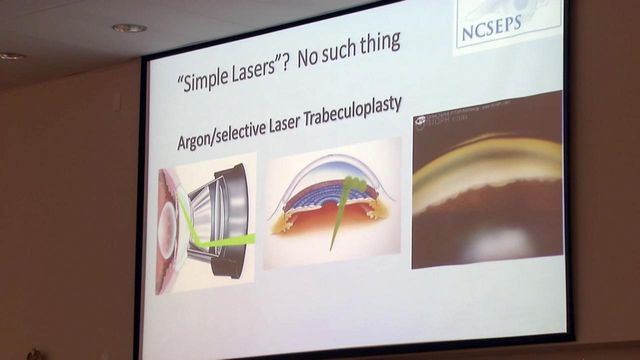Doctors don't see eye-to-eye on laser surgery legislation
Two different groups of eye doctors are battling over who should be able to perform certain types of surgery. The disagreement pits eye surgeons trained in medical schools against optometrists.
Posted — UpdatedOphthalmologists are medical doctors who specialize in treating the eyes and performing eye surgeries. Optometrists don't go to medical school but do get four years of specialized training in treating eye diseases and correcting vision.
"I believe this is a very important bill, and I'm extraordinarily disturbed by it," said Dr. Susan Burden, an ophthalmologist who teaches at the Wake Forest University School of Medicine and works for the Veterans Administration.
Burden said that optometrists who don't got to medical school don't have the training to recognize cancers or more complex problems that may initially look simple.
But proponents of the bill insist optometrists can do the procedures in question safely and give patients more access to eye care, particularly in rural areas where access to eye surgeons is limited.
"Our therapeutic options are mired in rules from 1977," said James Fanelli, an optometrist practicing in Wilmington who is also an adjunct faculty member at Salus in Philadelphia.
Fanelli and others pointed to a record of success in other states, where optometrists have faced few, if any, complaints about their performance regarding those surgeries.
Although this specific debate over eye care is new to North Carolina, this kind of "scope of practice" legislation frequently provokes high-stakes battles at the General Assembly. Nurse practitioners, midwives, teeth-whitening operations and nurse anesthetists have all been a part of recent legislative debates.
As with other such battles, this one has played out in the campaign finance world. Since 2012, doctors on either side of the debate have given state lawmakers at least $345,362 in campaign donations, according to the Institute for Money in State Politics. That figure doesn't count money spent on direct lobbying given in the first part of 2017 or not coded correctly in campaign finance data.
The arguments lobbed in the those other scope-of-practice debates also are similar to those brought out in the eye doctor debate. Proponents of allowing allied health professionals do more say widening their scope of practice would allow patients to have more access to the operations in question. They insist that their scope of training encompasses the procedures in question.
In this case, optometrists who presented before the committee Wednesday pointed out that schools of optometry are already training students on the procedures at the heart of the dispute and that Oklahoma, Louisiana and Kentucky already allow optometrists to perform them.
Lurking in the background is a debate over money. Dr. Galen Grayson, a medical doctor who sided with the optometrists, acknowledged the monetary stakes.
"Some ophthalmologists, including myself, will generate less revenue if optometrists are allowed to perform certain procedures," Grayson said. "This will be countered by cost savings to patients, who will pay less in co-pays and deductibles, as well as savings to insurance companies and the state and federal governments."
Representatives of the eye surgeons said money is the least of their concerns. Rather, they point to studies that suggest optometrists either might not perform the surgeries at issue as well or perform them too often.
"The eye surgeons who gathered here before you today have come not to protect their practices but to protect their patients," said Tom Fetzer, a lobbyist for the ophthalmologists.
Related Topics
• Credits
Copyright 2024 by Capitol Broadcasting Company. All rights reserved. This material may not be published, broadcast, rewritten or redistributed.





